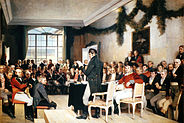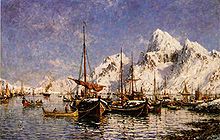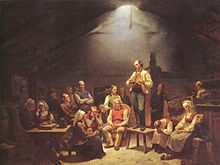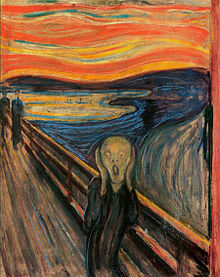- Norwegian art
-

Part of a series on
Norwegians
Culture Architecture · Art · Cinema · Cuisine
edit] The beginningsJohan Christian Dahl (1788–1857) is often said to be the "father of Norwegian landscape painting". After a period in Copenhagen, he joined the Dresden school to which he made an important contribution. He eventually returned to paint the landscapes of western Norway, defining Norwegian painting for the first time.[2]
Another important early contributor was Johannes Flintoe (1787–1870), a Danish-Norwegian painter, known for his Norwegian landscapes and paintings of folk costumes. He taught at the School of Drawing (Tegneskolen) in Christiania from 1819 to 1851 where his students included budding romanticists such as Hans Gude and Johan F. Eckersberg.[2]
Adolph Tidemand (1814–1876) studied in Copenhagen, in Italy and finally in Düsseldorf where he settled. He often returned to Norway where he painted the old Norwegian farm culture. His best known painting is The bridal procession in Hardanger (together with Hans Gude, 1848) and Haugianerne (Haugeans) painted in 1852.
Norway’s new-found independence from Denmark encouraged painters to develop their Norwegian identity, especially with landscape painting by artists such as Kitty Kielland, 1843–1914, an early female painter who studied under Gude and Harriet Backer, 1845–1932, another pioneer among female artists, influenced by impressionism.
Impressionists and neo-romanticists
Frits Thaulow, 1847–1906, an impressionist, was initially a student of Hans Gude. He was later influenced by the art scene in Paris where he developed impressionist talents. Returning to Norway in 1880, he became one of the leading figures on the Norwegian art scene, together with Christian Krohg and Erik Werenskiold.
Christian Krohg, 1852–1925, a realist painter, was also influenced by the Paris scene. He is remembered for his paintings of prostitutes which caused something of a scandal.[3]
Thorolf Holmboe (1866–1935) studied under Hans Gude in Berlin between 1886 and 1887 and Fernand Cormon in Paris between 1889 and 1891. He was inspired by many different styles at different points in his career, including Naturalism, Neo-romanticism, Realism and Impressionism.
Nikolai Astrup (1880–1928) grew up in Jølster in the west of Norway. After studying art in Oslo and spending some time in Paris and in Germany, he returned to Jølster where he specialised in painting neo-romantic landscapes with clear, strong colors. He is remembered as one of the greatest Norwegian artists from the early 20th century.[4]
Lars Hertervig (1830–1902) from Tysvær in south-western Norway painted semi-fantastical works inspired by the coastal landscape in Ryfylke.
Harald Sohlberg, (1869–1935), a neo-romanticist, is remembered for his paintings of Røros, and the Norwegian "national painting" Winter's Night in Rondane.
Edvard Munch
Perhaps Norway's most famous artist is Edvard Munch, (1863–1944), a symbolist/expressionist painter who became worldfamous for The Scream which is said to represent the anxiety of modern man. Painted in 1893, The Scream is Munch's most famous work and one of the most recognizable paintings in all art. It has been widely interpreted as representing the universal anxiety of modern man.[5] With this painting, Munch met his stated goal of “the study of the soul, that is to say the study of my own self”.
Other names
 Gunnar Berg's From Svolvær harbour, ca 1890. Being one of "the young dead", Berg is considered one of the finest painters of northern Norwegian nature.
Gunnar Berg's From Svolvær harbour, ca 1890. Being one of "the young dead", Berg is considered one of the finest painters of northern Norwegian nature.
Other noteworthy 19th century painters are: August Cappelen, Peder Balke, Peter Nicolai Arbo, Eilif Peterssen, Gustav Wentzel, Oscar Wergeland, Erik Werenskiold, Asta Nørregaard, Amaldus Nielsen, Oda Krohg, Fritz Thaulow, Carl Sundt-Hansen, Christian Skredsvig, Gunnar Berg, Halfdan Egedius, Theodor Kittelsen.
Noteworthy painters from 20th century Norwegian art are: Reidar Aulie, Per Krohg, Arne Ekeland, Kai Fjell, Jacob Weidemann, Håkon Bleken, Jens Johannessen, Ludvig Karsten, Henrik Sørensen, Kjartan Slettemark, Anna-Eva Bergman, Anders Kjær, Svein Johansen, Svein Bolling, Bjørn Carlsen, Bjørn Ransve, Kåre Tveter, Frans Widerberg, Odd Nerdrum, Ida Lorentzen, Knut Rose, Ørnulf Opdahl, Håvard Vikhagen, Leonard Rickhard, Håkon Gullvåg, Kira Wager, Lars Elling, Vibeke Barbel Slyngstad.[6]
19th century sculptors include Stephan Sinding, Gunnar Utsond, Brynjulf Bergslien and Mathias Skeibrok.
20th century sculptors include Gustav Vigeland, Nils Aas, Arnold Haukeland, Bård Breivik, Anne Grimdalen, Kristofer Leirdal, Per Palle Storm, Nina Sundbye, Dyre Vaa and Wilhelm Rasmussen.
In textile art Hannah Ryggen (1894–1970) holds a unique position. Frida Hansen was an art nouveau textile artist.
References
- ^ Painting from Norway Cultural Profile. Retrieved 28 November 2008.
- ^ a b Haverkamp, Frode (in Norwegian). Hans Fredrik Gude: From National Romanticism to Realism in Landscape. trans. Joan Fuglesang.
- ^ Norwegian Artists from ArtCyclopedia. Retrieved 25 November 2008.
- ^ Nikolai Astrup from nikolai-astrup.com. Retrieved 28 November 2008.
- ^ Eggum, 1984, p. 10
- ^ Selection of painters in section "Other names" are based on Tommy Sørbø Norske malerier, 2005. ISBN 978-82-516-2221-9. The selection of sculptors are not based in any source.
 Norway topics
Norway topicsHistory Geography Law Politics Constitution · Counties · Elections · European Union relations · Foreign relations · Government · Monarchy · Municipalities · Political parties · Prime Minister (List) · Romantic nationalism · Sámi Parliament · ParliamentEconomy Norwegian krone · National Bank · Oslo Stock Exchange · Education · Energy · Media · Tourism · Transport · Companies · WhalingMilitary Symbols Demographics Administrative divisions · Cities · Postal codes · Languages · Religion · Immigration · Norwegians · List of NorwegiansCulture Architecture · Art · Cinema (Actors) · Music (Composers) · Cuisine · Norwegian language · Literature (Writers · Poets) · Bunad · Jul · Constitution Day · Media · Football · Rugby union · Public holidaysEuropean art Sovereign
states- Albania
- Andorra
- Armenia
- Austria
- Azerbaijan
- Belarus
- Belgium
- Bosnia and Herzegovina
- Bulgaria
- Croatia
- Cyprus
- Czech Republic
- Denmark
- Estonia
- Finland
- France
- Georgia
- Germany
- Greece
- Hungary
- Iceland
- Ireland
- Italy
- Kazakhstan
- Latvia
- Liechtenstein
- Lithuania
- Luxembourg
- Macedonia
- Malta
- Moldova
- Monaco
- Montenegro
- Netherlands
- Norway
- Poland
- Portugal
- Romania
- Russia
- San Marino
- Serbia
- Slovakia
- Slovenia
- Spain
- Sweden
- Switzerland
- Turkey
- Ukraine
- United Kingdom
- (England
- Northern Ireland
- Scotland
- Wales)
- Vatican City
States with limited
recognition- Abkhazia
- Kosovo
- Nagorno-Karabakh Republic
- Northern Cyprus
- South Ossetia
- Transnistria
Dependencies
and other territories- Åland
- Faroe Islands
- Gibraltar
- Guernsey
- Jan Mayen
- Jersey
- Isle of Man
- Svalbard
Categories:- Norwegian culture
- Norwegian art
- Art by nationality
Wikimedia Foundation. 2010.
Look at other dictionaries:
Norwegian Critics' Association — The Norwegian Critics Association offices are located at Garmanngaarden in Rådhusgata 7, Oslo in one of the city s oldest houses. The Norwegian Critics Association (Norsk litteraturkritikerlag) is an organization for Norwegian critics in the… … Wikipedia
Norwegian National Academy of Fine Arts — location in Oslo The Norwegian National Academy of Fine Arts (Norwegian: Statens kunstakademi) is a Norwegian university offering studies in the areas of specialization painting, photography / video / film, digital art, sound art, sculpture,… … Wikipedia
Norwegian language — Norwegian norsk Pronunciation [nɔʂk] Spoken in Norway (4.8 million) … Wikipedia
Norwegian literature — By category Norwegian language List of writers Norwegian authors Writers Novelists Playwrights Poets Essayists … Wikipedia
Norwegian University of Science and Technology — Norges teknisk naturvitenskapelige universitet Established 1996 (1910, 1760) Type Public university … Wikipedia
Norwegian Native Art — Studio album by Einherjer Released 2000 … Wikipedia
Norwegian Canadian — Norsk kanadiere Melody Anderson · Melyssa Ford · Natassia Malthe · … Wikipedia
Norwegian Jewel — Die Norwegian Jewel während der Emsüberführung bei Leer (Ostfriesland) am 25. Juni 2005 Allgemeines … Deutsch Wikipedia
Norwegian parliamentary election, 2009 — 2005 ← members 14 September 2009 → 2013 … Wikipedia
Norwegian Army — Active 1628 present Country Norway … Wikipedia



